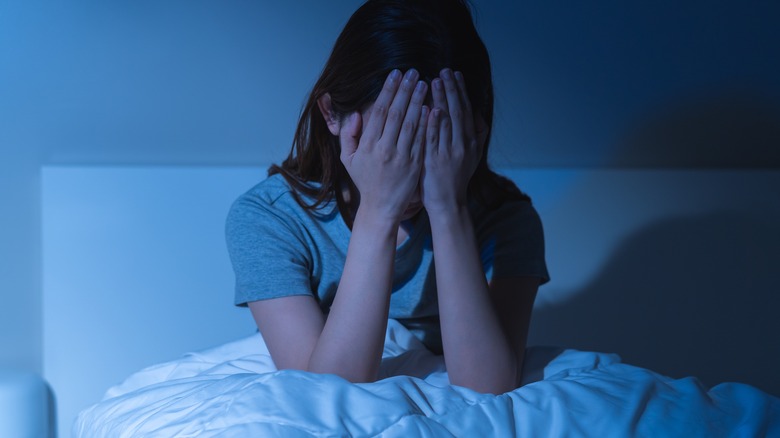How Often Should You Really Be Masturbating?
"To beat or not to beat (one's meat)?" For many folks, self-pleasure can be quite a sticky topic to discuss (pun absolutely intended). Some may fear the possible side effects of masturbating frequently; others may think that it's time to take it easy on playing a little 5-on-1 when a person passes a certain age. And others ponder the possible consequences of stopping masturbating entirely.
But how much is too much, really? Is there actually, er, a hard and fast rule when it comes to how frequently you should be engaging in some spicy DIY? Not really, according to Heather Shannon, a certified sex therapist and host of the "Ask A Sex Therapist" podcast. Speaking exclusively with Health Digest, Shannon shared her thoughts on the topic. "There is really no rule on this. However, I will say that stimulation and blood flow to our genitals [are] important for health and function. So there's an element of use it or lose it. If you go a long time without touch or stimulation to your genitals, they can actually atrophy."
Shannon advises touching yourself at least once a week or every other week if you're not having sex with a partner, "whether or not it's to orgasm."
Should you be masturbating more (or less) if you have a prostate?
Does the frequency of masturbation matter more if a person has a prostate? Or should people who choke the chicken do it just as frequently as folks who flick the bean? According to Heather Shannon, masturbation "may be good for prostate health" if one does it until they cross the finish line. "[Masturbation and ejaculation] are two separate processes," clarified the certified sex therapist. "Masturbation is self-pleasuring and stimulation. The function of the prostate is to produce and expel semen. So to state it more accurately, the prostate benefits from ejaculation."
Another reason why the answer isn't as clear-cut is that it can vary depending on who you ask. A few sexual health experts uphold the notion that ejaculating regularly can lead to a loss of vitality, and some men support this idea with anecdotal accounts of having increased energy and focus when they ejaculate less frequently. With that said, more research is required before a conclusion can be reached. Moreover, per Shannon, the release of hormones (e.g., oxytocin and prolactin) during orgasm may cause tiredness, too. "Just notice if this is only a short term issue or if it makes an overall difference in quality of life for you."
Is it possible to masturbate too much?
One more thing: When it comes to masturbation, is there such a thing as having "too much fun," so to speak?
"On the high end, there is really no limit," said Heather Shannon. "But I'd say to just make sure it's working for your lifestyle and body. You don't want to masturbate so much that it's interfering with your sex life with your partner, your work, or your time with friends and family! Masturbation should be something that enhances your life."
Some people may be comfortable with pleasuring themselves six times a day, while others may think that even doing it once is already too much. Shannon mentioned a number of factors that can affect your feelings about self-pleasure, including your sex drive, whether or not you have a partner, and your personal beliefs related to sex in general. "Sex and masturbation are holistic and live at the intersection of our physical, emotional, and spiritual health. You have to look at the overall picture of your life. And frankly, that picture changes at different points in our life."
Ultimately, Shannon's advice is simple: "Listen to your body and notice how you feel."


